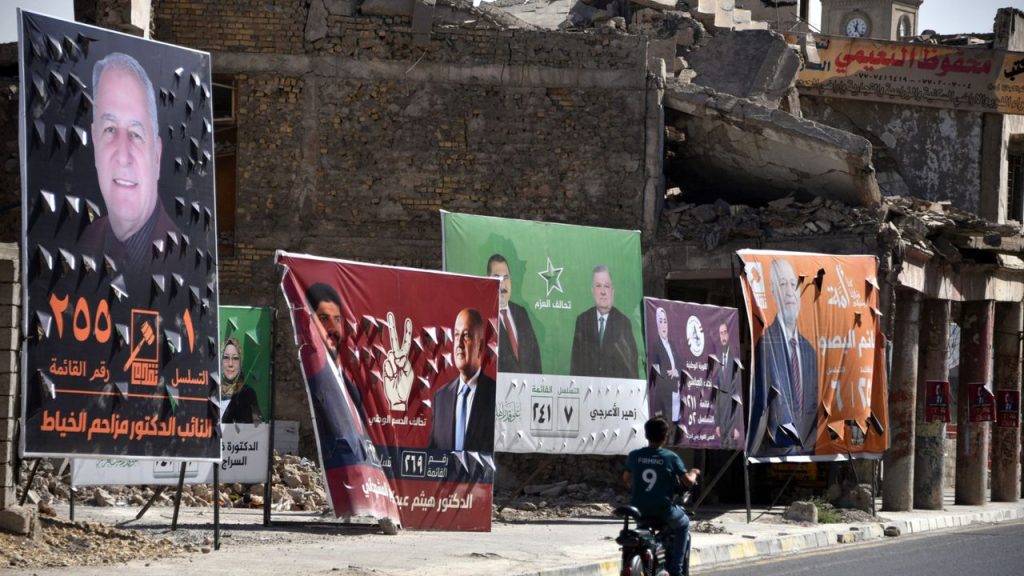Iraq’s election has been closely watched from way beyond its borders, as the young democracy finds itself in a power struggle between the US, Israel and Iran.
The parliamentary vote, the seventh since the US-led invasion toppled Saddam Hussein in 2003, ended last night. Although marred domestically by voter disillusionment, the vote could have far wider implications. Israel and the US are increasingly pressuring Iraq to dismantle the powerful Iran-backed groups that hold sway there. Meanwhile, as Iran’s influence “wanes” across the Middle East, its network of proxies decimated by Israel, it hopes to “preserve its power in Iraq”, said Al Jazeera. Iraq is its only close ally that has, since the war in Gaza began, “remained out of Israel’s crosshairs”.
What is the backdrop?
After the US-led 2003 invasion, Iraq suffered years of bloody civil war, sectarian conflict and the rise of Islamist extremist groups. The country adopted a power-sharing agreement: the prime minister is always a Shia Muslim, the speaker of Parliament a Sunni Muslim, and the president (a largely ceremonial role) is a Kurd.
Elections were still often mired in political violence and clashes between supporters of different blocs. But under the tenure of Prime Minister Mohammed Shia al-Sudani, Iraq has become relatively stable. He came to power in 2022 with the backing of a group of pro-Iran parties, but sought to “balance Iraq’s relations with Tehran and Washington”, said The Independent.
Now, he is struggling to maintain that balance, as tensions grow between the US and Iran. Israel is also threatening strikes, amid fears of another deadly war with Iran.
What does Iran have to do with Iraq?
Iraq represents a “vital sphere of influence” for Iran, which has been severely weakened by Israeli strikes, Western sanctions and the Trump administration, said the Middle East Council on Global Affairs.
In Iraq, a coalition of Iran-aligned militias known as the Popular Mobilisation Forces (PMF) dominates parliament. The PMF “forms part of a region-wide network of Iran-aligned armed groups” across the Middle East, including Hamas, Hezbollah and the Houthis. This network is “central to the survival” of Iran.
But since Israel declared war on Gaza in 2023, it has “wiped out” Hezbollah’s leadership in Lebanon and “decimated its rank and file”, as well as “decapitating” the Houthi government in Yemen. In Syria, the regime of key Iran ally Bashar al-Assad has been toppled. Israel’s campaign “could now turn to the PMF” in Iraq, especially if there is a “sequel” to its 12-day war with Iran in June. Against that backdrop, this election “could not be more critical to maintaining Iraq’s status as the lung through which Iran breathes”.
Where does the US come in?
The US still “holds significant sway” in Iraq, said Al Jazeera. Its forces are deployed across the country and are regular targets for pro-Iran groups. The PMF, for example, has a long track record of attacks on US bases in the country.
Washington designates these as “terrorist groups” and is pressuring Baghdad to disarm them. US envoy Mark Savaya recently called for Iraq to be freed “from Iran and its proxies’ ‘malign’ interference”.
How do Iraqis feel?
Voter turnout has been dropping steadily over the past decade, hitting a record low of 41% in the last election in 2021. Citizens have become disillusioned with high unemployment, poor infrastructure and endemic corruption, erupting into mass anti-government protests in 2019.
The popular Sadrist Movement, led by Shia cleric Muqtada al-Sadr, won the largest number of seats in 2021 but withdrew after failed negotiations over forming a government. He boycotted this election. Pollsters and analysts predicted a record-low turnout after widespread allegations of vote buying. But actually, turnout was reportedly over 55% of the country’s 21 million registered voters. Still, few believe these elections will bring meaningful change. The growing young electorate sees the elections as a “vehicle for established parties to divide up Iraq’s oil wealth”, said Reuters.
What’s going to happen?
Sudani’s bloc is forecast to win the most seats but fall short of a majority. That could mean months of negotiations between Shia and Sunni Muslims. Given the “fragmentation” and divisions within those blocs, Kurdish parties could “play kingmakers”, said Al Jazeera.
However, Sudani is “seen as unlikely to remain prime minister”, said Chatham House. The outcome of this “bargaining could test Iraq’s stability” and shake its “fragile equilibrium”.
“Iraq has so far avoided the worst of the regional upheaval caused by the Gaza war”, said Reuters. But if the next government fails to break Tehran’s grip and dismantle the Iran-backed militant groups, it will face both US and Israeli “wrath”.
The US and Israel are increasingly pressuring Baghdad to tackle Iran-backed militants, while weakened Iran sees Iraq as a vital remaining ally
